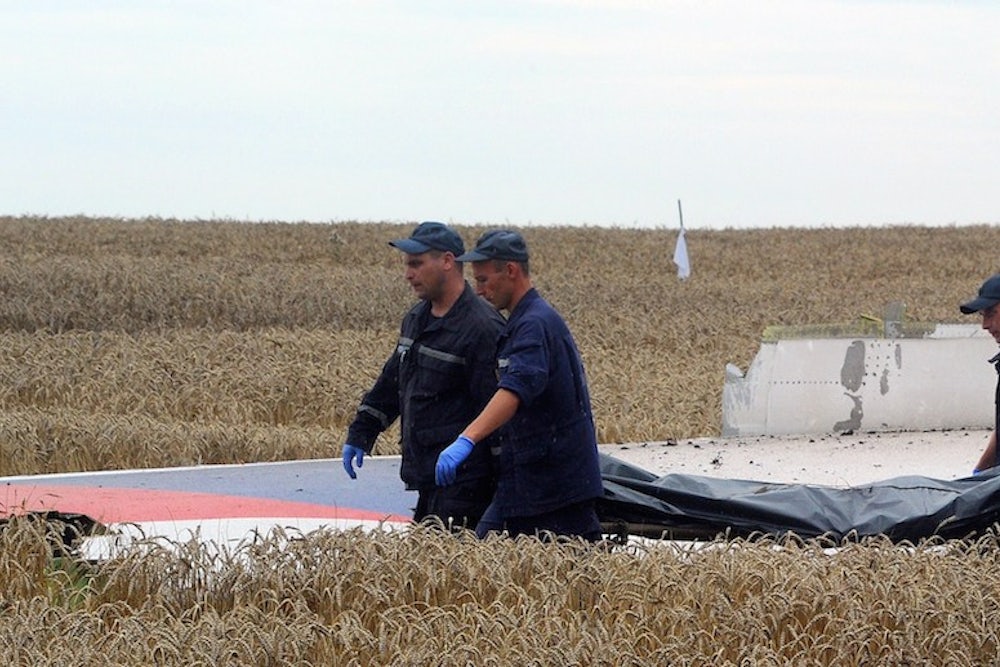Last Saturday, I woke up on a green stretcher. I don't remember how I fell asleep, but I remember how I woke up. By the horrible thought it was day. There was light. Now I would see it all. The only thought that comforted me was that from now on, things couldn't possibly get any worse.
In the 24 hours before, I had traveled from Moscow to the site of the crash of Malaysia Airlines Flight 17. For the past nine months, I’ve been covering the crisis in Ukraine for Volkskrant, a Dutch daily newspaper, and RTL-television, the country’s commercial broadcaster. I was traveling with my good friend Roland Oliphant, a reporter for the Daily Telegraph and Petr Shelomovsky, a rogue Russian photographer, and we bribed the conductor to get a spot on the train to Kharkov. We then drove for nine hours to the small village of where most of the debris hit—a ride through army-checkpoints manned by maniacs, deserted towns, bombed factories, and fields full of sunflowers. We could hear mortar shelling as we drove.
Waving a Dutch passport didn't help much. “I don't care where you're from. You'd be from Mars, I still check your documents and search your car,” a Ukrainian army-irregular told me. He had a grenade in his hand, the ring with the pin around his left finger as he flipped through the stamped pages of my passport. “Over 190 of my co-patriots died in that crash, you might just have the decency to wave me through,” I said. He looked back at me. “I don't give a fuck,” he said. The rebel checkpoints weren't any better. “You Dutch? You want to know what happened to the plane?” a rebel in the stronghold of Gorlevka asked me. “I tell you. It fell out of the sky. Just like that. Shit happens.”
When we arrived at the scene, a young rebel with a beard pointed his gun at us. “You are leaving. Now,” he said. It took effort to convince him we'd just stay for one cigarette. Then he reloaded his kalashnikov, pointed it in my direction, and sent us off. But before we could leave, the rebels were distracted by their radios. "Tanks are coming!" somebody shouted. They all drove off in their cars. Our driver left, too; he had enough and wanted to go home. We were stuck in the night, between the debris, the bodies. In a field. The local rescue workers happily shared their food, their moonshine, and their stretchers with us. They didn't want to talk, they needed to talk. In a good tradition, the workers drank to the people's friendship: “May the Russian and the Dutch people live in peace,” one of the first responders told, carefully weighing his words. We settled in for the night.
During Putin’s state visit to the Netherlands in April 2013, the mayor of Amsterdam refused to meet him, citing a “busy schedule.” Never, in all his years in office, had the Russian president been met with so much protest in the Netherlands. It was rumored that LGBT-demonstrators made so much noise outside of the national maritime museum that the diners had to be moved to a different room—plates, napkins, knifes, and forks in hand. Yet, mainly, we pretended nothing serious was happening in Russia—a masterpiece of ostrich policy toward the outside world. As long as we keep appearances, do business as usual, watch sales rises, let ships dock in the harbor of Rotterdam, and allow criminal regimes to use our nifty tax-constructions, all would be fine. We kept telling ourselves Russia was a “young democracy,” a term even Kremlin spin doctors kissed goodbye years ago.
I have been reporting on the crisis in Ukraine since day one. In the days when president Yanukovich refused to sign the EU-association, during the first protests in Kiev, when the whole thing turned violent, when nationwide Lenin-statues were toppled, when Yanukovich was forced to flee the country, when Crimea was annexed, and when the violence flared up in Eastern Ukraine. At times, it has been surreal. I vividly remember a live broadcast during which I was asked a bunch of questions on the rigged referendum in Crimea. The evening news opened with an item on Dutch corruption. Local deputies used public funds for campaigning. One deputy sponsored a local golf tournament; another one purchased red wine for around $100. “Back to Olaf Koens in Simferopol. Olaf, what is happening after the referendum?” I was tempted to say that rather then pocketing a few bottles of wine, a sovereign European nationstate was being invaded.
Something was bound to happen. The dangerous propaganda war was spinning out of control, both on the Russian and on the Ukrainian side. And every time something big happened, be it a clash between protesters and police or military maneuvers, I thought it was the end—that it simply just couldn't get any worse. After the violent crackdown on protesters in Kiev, after the shootings on Maidan. After Russia annexed Crimea, and after the violence flared in Eastern Ukraine. Yet every time it did. Then, it hit home.
On that green stretcher, I got up and walked trough the fields, in between the debris, the wreckage, the bodies and their belongings. I kept telling myself: This is the end. After this it just can't get any worse. But it will.
